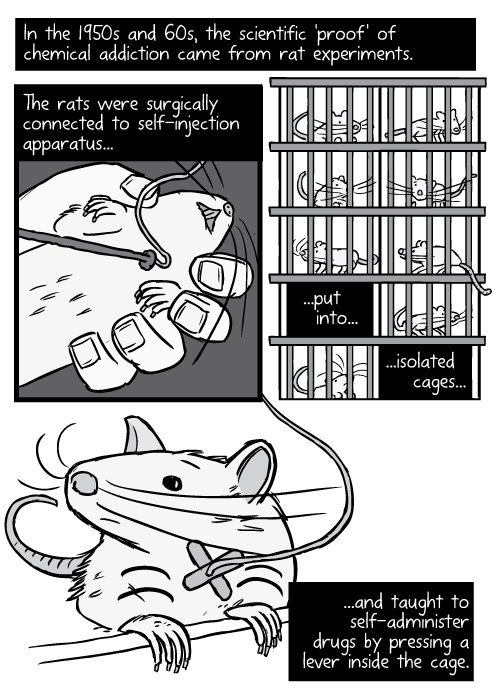REFLEXION: TREATMENT WITH VALUES

Hello steemians,
Why can't an addict recover simply?!
What is the secret of his attachment to the substance or addictive behavior?!
To answer this question, we must return to one of the most important scientific experiments on addiction:
The Rat Paradise and Morphine Water
In which scientists decided to lock up a laboratory mouse in a cage where he was given water, food, and water mixed with morphine. At first, the mouse did not drink morphine water except a little, but over time, he became completely immersed in drinking morphine to the point that he neglected to ask for food and personal hygiene and slept most of the time;
After a while, the scientist responsible for the experiment decided to create a garden full of male and female mice, and let them reproduce together until they formed their own community, and then he placed the addicted mouse among them. At first, the addicted mouse accepted morphine as was his habit, but over time he began to integrate into his new community, and because of this integration, he completely forgot about morphine, and lived his life with the rest of his kind without resorting to morphine water.
The relationship between society and recovery
This experiment has proven that the community environment has a great impact on recovery from addiction;
But there is a simple dilemma:
Humans are not mice, we see someone who is already strongly involved in society and has many jobs, a family and children attached to him, and despite that he is an addict and sometimes takes his drugs on a daily basis, or even a housewife who takes care of her husband and a group of children, we find her taking a type of drug to help her bear the pressures of daily life
So how can those who are part of society and have an important role in it and are not isolated from it, be addicts?!
The psychological environment is more important than the community
In my opinion, the reason goes back to the psychological environment of the addict and not only the community environment that creates or treats addicts.
The mouse in the experiment felt his value when he felt the importance of his role in his new society, and when he received the necessary support from them, and here is the difference: the mice supported the addicted mouse because this is their instinct, unlike humans who can choose between helping and abandoning or even ostracizing.
For a long time and even to this day, addiction is considered a stigma of any kind, although cigarette addiction, for example, is not a social defect and people consider it just a bad habit, although it is no less dangerous than other types of addiction, but in fact it is worse because it is more available and easy.
But people choose the defect according to what is imposed by traditions and societal concepts, and not according to what is best for the public interest or based on morals and good qualities.

The price of the mistake is amputation
Here the basic problem of the addict emerges:
The most important fundamental difference between the rat society and the human society is that the rat used to drink morphine in front of the rest of society before recovering and no one abandoned him because of that and no one despised him because of that.
As for humans, the first thing you will face from them in the first moments of your confession of your problem is bullying, blackmail, rebuke, abandonment, and even assault, humiliation, and ostracism, and you will feel that they are pushing you to return to addiction.
Here begins the real problem of the addict, the state of weakness in front of himself that the addict suffers from makes him doubt himself and his ability to recover, and thus he begins to search for help to get out of the trap of addiction, but when he gets the exact opposite and his society rejects him, his self-confidence collapses, and then he believes all his obsessions and abnormal thoughts, and this is what makes him lose all respect for himself.
Either escape to death or defend addiction
Either he is psychologically crushed and remains in a state of shame of himself, introversion and social withdrawal, until he is alienated from life altogether and commits suicide.
Or he chooses to respond and defend his addiction, and admits his addiction in front of everyone without any regret or fear to defy the society that refused to help him, but in return he sinks worse in his addiction and refuses any form of treatment.

The Three Origins of Addiction
When thinking about addiction, it is important to know that this type of problem stems from three origins:
The first: Psychological behavioral problems that stem from social and family circumstances specific to the addict, which create a psychological readiness for addiction within him, because the addict is trying to compensate for something internal through addiction.
The second origin: Organic brain problems, as the addict's brain gets used to the high doses of stimulation it gets from addiction over time, so the brain continues to demand the substance or addictive behavior no matter the cost.
As for the third origin of addiction, it is: the guilt complex cycle, because the substances and behaviors that cause addiction are considered shameful things that detract from a person's chivalry and undermine his honor;
This particular origin is the most important reason for staying in the circle of addiction, because the addict remains most of his addiction period in a state of complete secrecy and concealment, to appear to people in a way that is opposite to the way he appears to himself, which creates a deep guilt complex inside him, and getting rid of it pushes him to return to the addictive substance or behavior that numbs this pain a little.
Acceptance is the first dose of treatment
Based on these three foundations, we understand that the first and most important step that the addict needs to recover from his illness is not to admit the illness as much as it is for society to accept him and try to provide him with help.
The addict's mere feeling that he is accepted among the members of his society, and that people have not forgotten the good side of him when they saw the ugly side, gives him a deep sense of belonging that pushes them to recover at any cost.
Value is what determines the goal
The whole problem revolves around the meaning that the addict believes in. If he believes that he has a role and importance in society, he will try to maintain this role at any cost, because he does not want anyone to be harmed because of him at least.
But when the addict loses faith in this meaning, he cannot recover even if he tries, because the deep psychological motivation is not present, which is like the engine for a car. If the car is full of gasoline, without an engine it will not move from its place.
Rats are more rational
Unfortunately, the rat community has outdone the human community in this regard. The rat community was more accepting of the addicted rat than the human community, which rejects addicts and tries to keep them away.
Best Regards,
@kouba01

